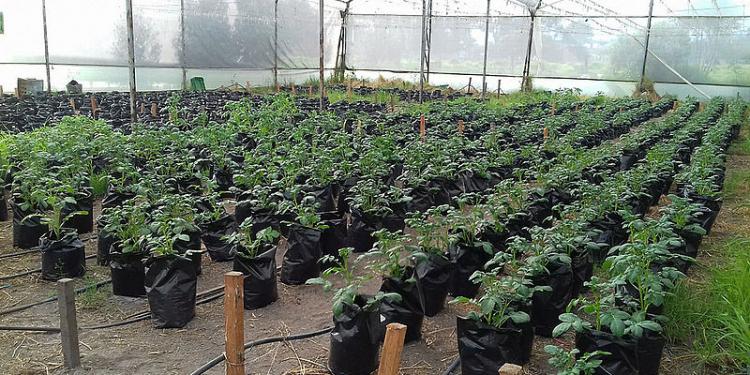After conducting experiments with treatments to improve the behavior of a Creole potato crop under conditions of water deficit, an investigation carried out by the National University of Colombia found that calcium chloride and nitrate would improve its production.
According to the research, in productive terms, the plants that did not have this treatment or calcium supplement reduced their yield by 55.3%, while in the plants that did, that reduction was only 3% to 5%.

The foregoing was revealed by the agronomist Wendy Tatiana Cárdenas Pira, Master in Agricultural Sciences from the National University of Colombia-Unal Bogotá, who, considering some treatments that can mitigate drought in potato crops, wanted to evaluate whether the application of treatments of calcium could mitigate this problem of stress due to water deficit.
“The objective was to look from the technical and scientific part, the application of a treatment so that, in the face of a drought situation, it is possible to mitigate it in an easy way,” said the agronomist who also specified that these treatments were evaluated at the beginning. tuberization (in which the tuber is formed), which is one of the most susceptible stages of the crop.
This research is relevant since it has been seen that many potato farmers are located in areas prone to droughts and furthermore, this is aggravated because adverse weather conditions are also being reported that include the occurrence of phenomena such as El Niño. On the other hand, most farmers lack an irrigation system, which means that, in their growing cycle, they face a period of drought that will limit production.
It is worth noting that this study, directed by Professor Liz Patricia Moreno Fonseca and co-directed by Professor Luis Ernesto Rodríguez Molano, both from the Unal Sede Bogotá, worked with potatoes of the Criolla Colombia variety, which is the one most cultivated by the farmers due to its performance characteristics and because, according to other studies, it is one of those that expresses less susceptibility to water deficit conditions.
As highlighted by the Unal News Agency, the research started from what was found in the literature and 10 treatments were applied to see what would be the response of the potato subjected to a condition of water deficit: 5 were tested with application edaphic (directed to the ground) and 5 with foliar application (on the leaves).
Then a physiological evaluation was made: the plants were subjected to a water deficit at the beginning of the tuberization period and variables of the physiological behavior of the plant were taken. The relative water content was especially measured, a variable that is generally associated with the water status of the plants.
In addition, parameters that are considered especially for industrial processing were determined: dry matter, specific gravity and potato yield in terms of the number of tubers per plant and grams of tuber per plant. All this was carried out under semi-controlled conditions, under a greenhouse, at the Faculty of Agrarian Sciences of the Unal Sede Bogotá.

With this process, carried out in two trials, it was found that calcium chloride and nitrate treatments can be favorable by reducing the effects of water deficit, since, although there is a reduction in yield, this is significantly lower than a plant that does not have that contribution.
Finally, it indicates that the next step that could be taken with this basic information is to evaluate these results in a field condition, that is, without cover, which is how potato crops are usually found in Colombia. Although in this trial the conditions were controlled and we wanted to simulate what could be presented in the field, the ideal is to evaluate the behavior of the treatments in more real conditions.








